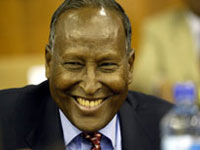Somali president catches cold
Somalia's president suffered from a severe cold and was hospitalized Tuesday in the capital of neighboring Kenya. His condition was stable. The trip comes at a time of political setbacks and violence at home.

The 73-year-old Abdullahi Yusuf, who had a liver transplant in 1996 and has suffered chronic health problems for years, was flown to Nairobi early Tuesday and was able to walk from the plane to a waiting car, said Ali Mohamed Sheik, a protocol officer for the Somali Embassy in Kenya.
"He was walking, he was better than we expected," Sheik told The Associated Press. "He is suffering from a severe cold but he is stable."
Dr. Mauro Saio, a specialist at Nairobi Hospital, said the Yusuf had been coughing and wanted a checkup in Kenya because there are better facilities here than in Somalia.
"He's very comfortable," Saio said. "The president will be going for a routine checkup in London in two or three days' time."
In 2006, Yusuf survived a suicide car bomb attack that killed his brother and several others.
Yusuf's government, with help from neighboring Ethiopia, has been battling a ferocious Islamic insurgency that has killed thousands of people this year. The United Nations says Somalia is facing Africa's biggest humanitarian crisis.
Late Monday, four Somali Cabinet ministers resigned less than 24 hours after they were appointed, saying their clan is not adequately represented in the new prime minister's government.
The resignations are a blow to Prime Minister Nur Hassan Hussein, who took office last month pledging to work for reconciliation in a country struggling with an Islamic insurgency and clan divisions.
"We feel that there is scorn against our clan, which violates the power-sharing system our government is based on," said Hassan Mohamed Nur, who resigned as minister of national security. He and the other ministers who resigned are members of the Rahanwein clan, one of Somalia's four major clans.
Somalia's transitional charter, established 2004, requires the equal representation of the four main clans and a minor one in government. The prime minister was careful to ensure the clans were represented in appropriate numbers, but some lawmakers were disappointed they did not get key posts.
Government officials were not immediately available for comment on the resignations.
Meanwhile, violence continued to rock the capital. Early Tuesday, two brothers were killed and their father seriously wounded when a mortar slammed into their home, witnesses said.
Ethiopia came to the aid of Somalia's government last December to rout the Council of Islamic Courts militia. The Islamic group's fighters have since launched an Iraq-style insurgency, and gunbattles, grenade and mortar attacks have devastated this seaside capital. Thousands of civilians have been killed or forced to flee the war-ravaged capital.
Somalia has not had a functioning government since warlords overthrew a dictator in 1991, then turned on one another. The government was formed in 2004 with the support of the U.N., but has struggled to assert any real control.
Subscribe to Pravda.Ru Telegram channel, Facebook, RSS!


